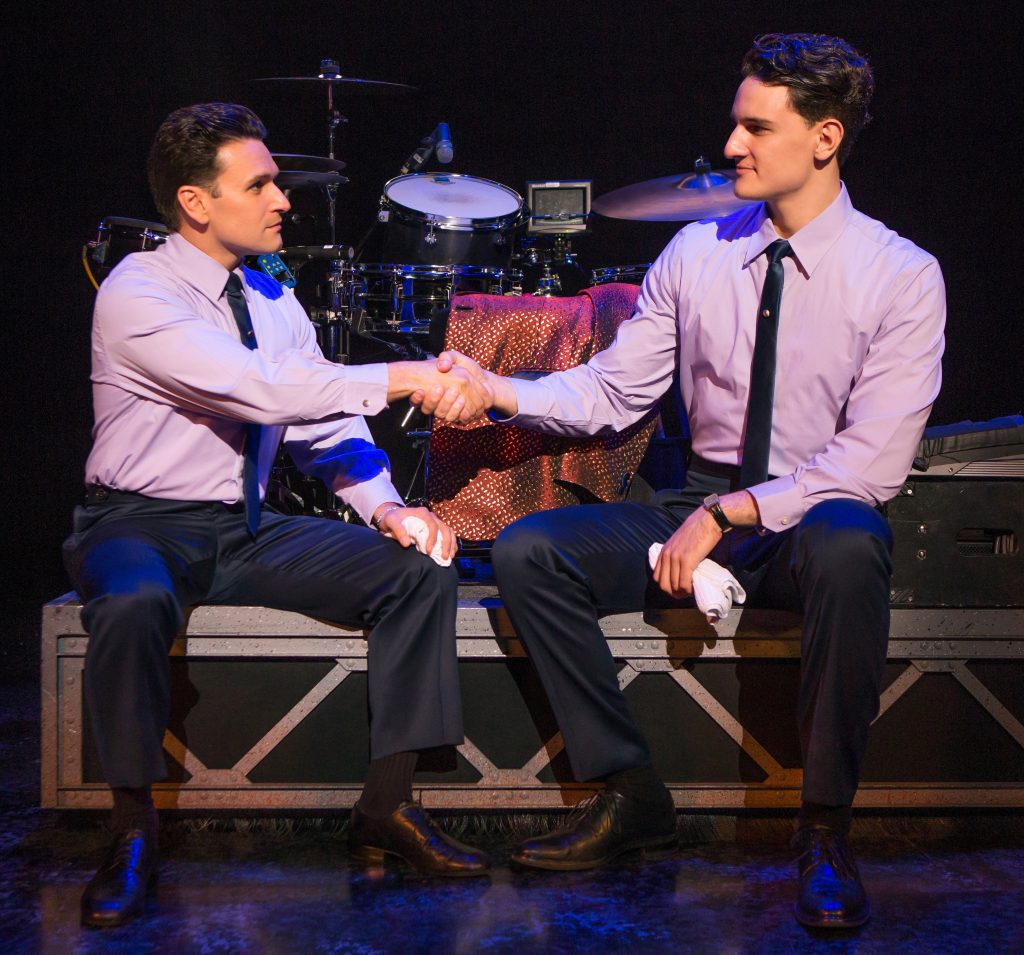Broadway SD’s ‘Jersey Boys’ Delivers Just Like Old Times

Life with the Four Seasons was far from the tinsel-and-glamour persona that the flashy cast depicts. Photos by Jeremy Daniel.
“She ain’t waiting for you, soldier; toy soldier, poor boy,” reads the lyric as the guy’s girl/wife finds a new squeeze — the complex harmonies and the great bass line drive one of the best musical “Dear John” tales of the decade.
Jersey Boys — the Seasons bioplay that premiered at La Jolla Playhouse in 2004 to become an international hit amid four Tonys, an Olivier, a Grammy and a 12-year Broadway run — doesn’t include the song among its 35-entry set list. And Marshall Brickman and Rick Elise’s book spends too much time on exposition that never really leads anywhere. But those things don’t make this show a bad one; on the contrary. The musical execution here drives the story every bit as effectively in 2017, and the performers step in and out of their narrative roles on a dime. With or without “Toy Soldier,” this premier jukebox musical from Broadway San Diego exudes a remarkable sense of itself, one you can’t help experience.
The story chronicles the Newark natives’ trek to musical infamy through the four seasons (in reality, the group took its name from a lounge in a Union, N.J. bowling alley). They’d persist in the 1950s alternately as the Variatones and the Four Lovers, an uncharacteristic handle for the state’s rough-and-tumble streets but an uplift amid that same roily grit of day.

Maybe the driver had an ulterior motive. In the Jersey of the ’50s and ’60s, you never knew.
But history had other ideas amid the work of keyboardist/writer Bob Gaudio and writer/producer Bob Crewe (Cory Jeacoma and Barry Anderson) — and with the addition of the late bassist Nick Massi (Keith Hines), the group was on its way with 1962’s “Sherry,” at once the Seasons’ first charted hit and its first No. 1 entry. “Big Girls Don’t Cry” and “Walk Like a Man” would follow as chart toppers; the rest is history as the group was inducted into the Rock ‘n’ Roll Hall of Fame in 1990.
Valli, now 83, still tours as part of the Four Seasons Partnership legal entity.
Indeed, the Seasons vied with The Beach Boys as the biggest-selling pre-Beatles group in American history.
“We weren’t a social movement,” Gaudio says in this show. “Our fans didn’t wear flowers in their hair.” The nonelitist Jersey crowd — the babysitters, the rank-and-file, the grocery checkers, the car wash guys — led the charge the same way the Midwest fueled Motown and California fed the West Coast sound. Indeed, the Seasons vied with the Beach Boys as the biggest-selling pre-Beatles group in American history.
But the backstory here rears its head as surely as the music, and without overt references to drugs and alcohol. Prison records, women and the grind of the road (sometimes all three) pepper the plot as the Seasons assume a thuggish bravado behind closed doors. DeVito’s money and tax problems color the scenes even as the Mob is called on to keep him in line. All the while, the group continues its assault on the ’60s charts, its schizophrenic mien largely consigned from prying eyes.
That’s where helmer Des McAnuff comes in. A former Playhouse artistic director, McAnuff premiered the show and is a singer and musician himself — hence the keen sense of cadence he bestows on the men’s private tribulations (the 1980 drug-overdose death of Valli’s daughter Francine is especially well-cast). Amid it all, and thanks to McAnuff’s colossal coaching, the performers swirl in and out of their narratives like child’s play. Klara Zieglerova’s bare-bones grid of a set lets the story and music take command, as do Howell Binkley’s lights and Jess Goldstein’s costumes. Gaudio’s music and Crewe’s lyrics underscore a varied and intriguing sweep of a story.

Frankie Valli (left, Aaron deJesus, alternately Miguel Jarquin-Moreland) makes peace with Tommy DeVito (Matthew Dailey) over the latest flap to shadow the Four Seasons.
(My publication intervened at the time, paying my way in — so take that.)
But as I said following the Jersey Boys premiere, McAnuff, who with Pete Townshend wrote the libretto for The Who’s Tommy, does have a certain way with commercially exploitable material (which the Seasons provided amid the ’60s musical upheaval). In the face of such product, he’s a different director, and it certainly shows here. His Jersey Boys is a very nice piece, entirely worthy of its generous collection of accolades.
This review is based on the media night performance of May 10. Jersey Boys runs through May 14 at Civic Theatre, 1100 Third Ave. downtown. $22-$127. 1-800-745-3000, broadwaysd.com.

Martin Jones Westlin, principal at editorial consultancy Words Are Not Enough and La Jolla Village News editor emeritus, has been a theater critic and editor/writer for 25 of his 47 years…
More…


